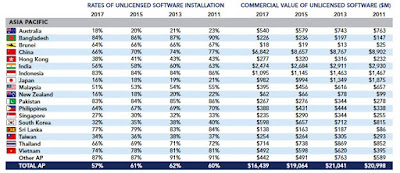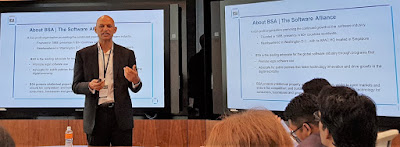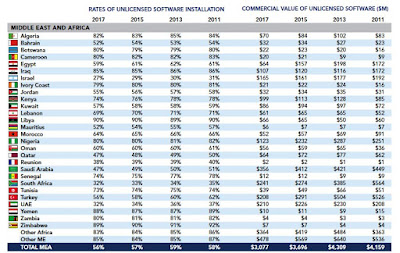The recent 2018 Global Software Survey from BSA | The Software Alliance, titled Software Management: Security Imperative, Business Opportunity, supports the findings of Microsoft’s Asia PC Test Purchase Sweep. Microsoft’s study revealed that a significant number of PCs in Asia, approximately four out of five (83%), are equipped with pirated software.
Tarun Sawney, the Senior Director for Asia Pacific at BSA, highlighted the persistent issue of unlicensed software. Globally, unlicensed software constitutes 37% of all software installed on personal computers, marking a 2% decrease from 2016. Although the commercial value of unlicensed software experienced an 8% decline in constant currency, settling at US$46.3 billion globally, it still represents a significant sum.
Despite unlicensed software being a selling point for many vendors worldwide, BSA emphasizes its security risks. Malware originating from such software costs companies globally almost US$359 billion annually. CIOs consider mitigating data breaches and security threats posed by malware as the primary reason for maintaining fully licensed networks. Conversely, companies that implement software asset management (SAM) and software license optimization programs can boost profits by up to 11% and achieve savings of up to 30% in yearly software expenses.
Source: 2018 Global Software Survey from BSA. Rates of unlicensed software installation in the Asia Pacific region for 2017.
Sawney pointed out that the Asia Pacific region has the highest rate of unlicensed software use globally, resulting in the most substantial financial losses. Over half (57%) of software in this region is unlicensed. Although the commercial value of unlicensed software in the area decreased to US$16.4 billion from US$19.1 billion in 2015, it remains the highest worldwide.
Within the Asia Pacific region:
▪ Bangladesh has the highest rate of unlicensed software use at 84%, closely followed by Indonesia and Pakistan, both at 83%. ▪ Japan and New Zealand have the lowest rates, both at 16%, with Australia slightly higher at 18%. These three economies saw a 2% reduction, partly due to the growing adoption of cloud-based services and software subscriptions among businesses. ▪ Every Asia Pacific economy surveyed showed a decline in the rate of unlicensed software use, with China and Vietnam experiencing the most significant drops. China’s rate fell from 70% in 2015 to 66% in 2017, while Vietnam’s dropped from 78% to 74% over the same period. ▪ Hong Kong and Singapore saw considerable decreases in shipments (-22% and -13% respectively) and installed base (down 17% and -12% respectively), demonstrating successful intellectual property protection efforts.
According to the survey, several factors influenced these statistics. These include a reduction in both enterprise PC shipments and the overall installed PC base, a decline in the consumer share of PC shipments in many regional economies, increased enforcement and legalization efforts by governments in the Asia Pacific, and a rise in the use of software-as-a-service (SaaS or cloud) subscription models.
Sawney introduces the BSA at Microsoft’s Digital Trust Asia event in Singapore.
The Middle East and Africa region follows closely behind Asia Pacific with a 56% unlicensed software rate, although the estimated value of this software is significantly lower at just over US$3 billion. Yemen has the highest rate of unlicensed software in the region at 88%, followed by Iraq at 85%.
Source: 2018 Global Software Survey from BSA. Rates of unlicensed software installation in the Middle East and Africa region for 2017.
Sawney explained that the declining rates are partly attributed to companies being more cognizant of the risks associated with unlicensed software. An IDC study revealed a strong correlation of 0.78 between unlicensed software and malware infections in different countries. The economic impact of addressing malware attacks has reached US$10,000 per infected PC in enterprises globally, he added.
“CIOs are recognizing the connection between malware and unlicensed software, whereas previously, they might not have been as concerned,” Sawney said.
Legal repercussions are another contributing factor. Sawney commended China for establishing courts specializing in intellectual property cases, holding violators of software licenses more accountable. “These courts in China are enacting and enforcing strong intellectual property laws. The decisions they’re making are proving to be very effective, and for the first time, we’re seeing consistent rulings,” he explained.
“In the past, there were minimal consequences, but now there is a higher likelihood of being caught. This has created a legitimate threat for those using unlicensed software – not just a cybersecurity threat, but a legal one.”
Creating the right environment for enforcement requires a combination of factors, he emphasized. The legal system must keep pace with technological advancements, and a pool of professionals specialized in intellectual property law is crucial. Additionally, courts need sufficient capacity to handle the volume of cases effectively.
Explore:
The 2018 BSA Global Software Survey was published in June 2018. Download the report (PDF)
Read the WorkSmart Asia blog post about the PC Test Purchase Sweep
*BSA’s Global Software Survey, conducted in partnership with IDC, estimates the amount and value of unlicensed software installed on personal computers in 2017 across more than 110 national and regional economies. It also reveals key attitudes and behaviors related to software licensing, intellectual property, and emerging technologies based on a global survey of over 20,000 respondents and nearly 23,000 responses from consumers, employees, and CIOs.


